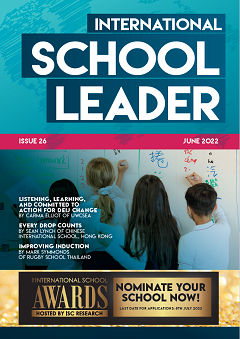The English School, Kuwait won the International School Awards Safeguarding Award 2021 for a safeguarding initiative that supports its entire international community and that of the wider schools network throughout the country.
In 2016, Kuwait’s Ministry of Health implemented the Kuwait National Child Protection Program. The introduction of these measures brought the conversation of safeguarding to a public arena for the first time in this conservative country. As the strategy gained attention, The English School recognised the opportunity to support this paradigm shift in understanding, and took the decision to be accountable for promoting and embedding the agenda across our community.
Safeguarding within an international context
There are several factors that make the potential risks and possible harm to children more likely within an international school community, but the likelihood of disclosures or reporting are rarer. Often, discussions about how to safeguard children in the Gulf revert to stereotypical views of the region’s religious and cultural attitudes. Less known is the positive change in mindset that is becoming more prevalent due to the realities of a modern and international life.
The often unspoken challenges of international school communities include: the mobility of families and the possibility of children going missing in education; staff turnover and the importance of safer recruitment; and the vast array of conflicting cultural viewpoints due to diversity and the importance of developing a shared understanding about abuse and neglect.
Although we are a British school, we are also an international school in Kuwait with many nationalities within our school community, so when planning our safeguarding initiative, we knew we could not simply base it on British values. However, there is no comparable term or position for being international. Therefore, our school’s ethos and values – that we consider keeping children safe and well as the prerequisite for healthy development and effective learning – underpinned our core purpose.
Developing a sustainable safeguarding programme
We adopted a three-point approach to our initiative in order to raise the profile of safeguarding within the school community, targeting training, systems, and introducing a curriculum to educate children to keep themselves safe from harm.
The first stage was to improve the quality and frequency of safeguarding training. Initially, this was aimed at staff. When this became an area of strength, the school extended training to our parents through parent partnership workshops, and to the wider community by training the British Council of Kuwait staff.
The second stage was to improve and enhance our safeguarding systems. An audit identified the need to redraft relevant policies and redesign procedures to improve efficiencies, including acquiring Breezy, a robust HR system. Beyond reshaping our internal practices, a barrier to achieving stronger systems was the shortage of guidance and support available to schools, and the lack of a joined-up inter-agency approach to prevention. Kuwait, unlike the UK, does not have a safeguarding infrastructure such as local authorities and safeguarding boards. Therefore, setting up a designated safeguarding lead support network for BSME schools within Kuwait (of which we are a member) was fundamental. This was named the Safeguarding Forum.
The final stage was to design our own progressive educational programme.
From plan to reality
The school’s governing body was supportive of the initiative, but from the onset were keen for us to work within the parameters of Kuwait’s Ministry of Education. We developed a positive relationship with the Kuwait National Child Protection Team including its Director of Child Protection in the Ministry of Health, Dr Mona Al-Khawari. This helped to evolve our initial idea to an approach that we felt could make a difference to children and designated safeguarding leads within Kuwait.
At the heart of the initiative is our pupils. In Pre-Prep, we designed a programme called REACH (respect, emotions, authority, care, help). This child-centred strategy involved teaching children to take an active role in keeping themselves and others safe and protected from harm. We wanted to equip our pupils with the knowledge, skills and understanding to identify potential risks and to seek support from a trusted adult if needed.
In Prep, our pupils took ownership of leading and delivering a strategy around online safety. The programme also linked to the school’s vision to be a fully integrated e-learning school and therefore targeted two core aspects of our school development plan. Students took a central role in creating resources and delivering training for their peers and their parents, led by a group of pupils called the IT Crew.
Communicating the agenda successfully through adult and pupil-led parent partnership workshops to obtain parental buy-in was important. The school discussed the rationale, content and delivery, and the vocabulary and terms. To our surprise, parents were open and supportive of the programme. There was a shared view about potential risks, including peer-on-peer. Inherently, parents saw the benefit in educating all pupils to instil the core concepts behind the REACH and IT Crew strategies.
Our REACH programme taught pupils how to use values like respect, integrity, empathy, and confidence through our focus on emotions and authority to develop a sense of right and wrong, and decision-making. Additionally, the IT Crew exhibited confidence and positivity in their ability to train pupils and parents about the strengths and weaknesses of online technologies.
Community engagement and sustainability
The greatest challenge has been cultural perspectives that conflict with the essence of our safeguarding agenda. The assumption is that Kuwait views this subject as taboo. However, the reality is that the tide is turning through the efforts of organisations like ours and we have seen a willingness to create a positive change.
As a result of organising the Safeguarding Forum, we became aware that other schools within Kuwait were not covering this important topic and had been reluctant to do so due to a fear of the subject, its taboos, and the lack of support structure around it. However, they were keen to see how we would deliver this learning, and openly declared they would follow our lead and use the school’s resources and support. Although standing alone was a scary position, we became a forerunner in addressing and educating children about safeguarding and mobilising other schools.
Pre-empting and addressing cultural clashes of opinion from non-Kuwaiti families is harder. Nevertheless, opening the channel of communication is unprecedented in Kuwait and is a significant achievement.
The programme is in its infancy and has been stalled by many months of school closures and a period of e-learning. However, the momentum and support are still strong. There is scope to introduce further safeguarding areas in the future, but it is also important to embed those that have already been launched.
Further staff training on what can be considered a sensitive subject is required. Moreover, safeguarding is a continuous process that requires regular review and development. It is important that it remains a talking point and all stakeholders grow in confidence in recognising signs and symptoms and following correct procedures. Addressing the cultural barriers will be an ongoing challenge that is amplified by a high turnover of our community. Establishing a self-regulating system to disseminate safer practices from our long-standing school community members to our newer members will be key to the initiative’s sustainability.
Advice
- Consider your school’s context. This will shape everything else.
- Use an audit to inform an action plan.
- Develop a shared expectation.
- Get stakeholders involved, especially students.
- Keep the safeguarding profile high through discussions, support, and ongoing training.


Alison Peterson is Head teacher and Tracey Francis is the designated safeguarding lead and Head of Pre-Prep at The English School Kuwait. Connect with Alison on LinkedIn
Subscribe to ISL Magazine for more!


